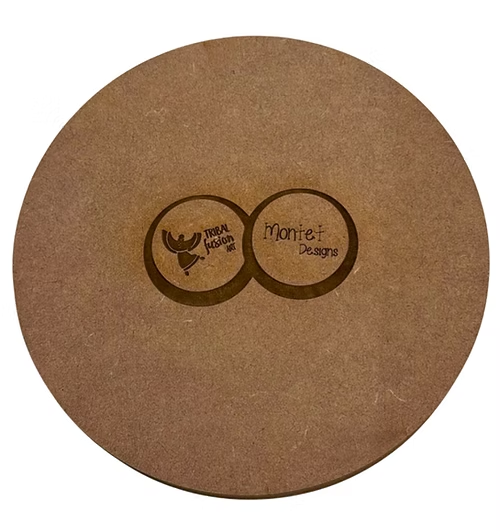Bear (Courage)
Description
Mukwa (Anishinaabe / Anisininew), Muin (Mi’kmaq)
Courage is represented by the Bear—Mukwa in Anishinaabe and Anisininew languages, and Muin in Mi’kmaq. The Bear is a powerful figure in the natural world, respected for its strength, resilience, and fierce protection of what matters most. Within the Seven Grandfather Teachings, Bear teaches us that courage is not the absence of fear, but the will to face it with integrity, clarity, and heart.
This kit includes a beautiful selection of hand snipped glass mosaic tile, ready for you to place and glue. Creating a beautiful addition to your home décor, bringing a burst of colour and a unique design.
Suitable for complete beginners with no special tools.
Kit includes:
- 21cm MDF engraved Turtle template
- Selection of hand snipped glass mosaic tiles
- 40ml PVA glue
- 150g Black grout
- Mosaic & grouting instructions
- The 7 Grandfather Teaching Information Card with details about Turtle and the 6 other designs in the series.
Teachings
COURAGE – Bear / Mukwa / Muin
Courage is represented by the Bear—Mukwa in Anishinaabe and Anisininew languages, and Muin in Mi’kmaq. The Bear is a powerful figure in the natural world, respected for its strength, resilience, and fierce protection of what matters most. Within the Seven Grandfather Teachings, Bear teaches us that courage is not the absence of fear, but the will to face it with integrity, clarity, and heart.
Courage begins inside us. It is the strength we summon when we encounter hardship, loss, or uncertainty. Bear reminds us that the greatest battles we face are often within ourselves: confronting our insecurities, holding ourselves accountable, and learning to forgive. Real courage is not loud or aggressive—it is the quiet decision to do what is right, even when it is hard. It is the steady walk forward when retreat would be easier.
Among the Anishinaabe, Anisininew, and Mi’kmaw Elders who have shared their knowledge, the teaching of Bear is often connected to leadership and responsibility. Bear does not act recklessly—it pauses, assesses, and chooses its path with purpose. Likewise, we are called to make courageous decisions through reflection and communication. Whether we are standing up for others, confronting injustice, or navigating conflict, courage guides us to act from a place of wisdom and compassion.
In our families and communities, courage shows up in many forms. It’s seen in the parents and grandparents who strive to break cycles of harm. It lives in those who speak their truths, even when their voices shake. It shines in those who stand with others—advocating for the land, for culture, for languages, and for future generations. These are acts of courage rooted in love and responsibility.
Bear also teaches us about boundaries and protection. Courage involves knowing when to say no, when to walk away, or when to defend what is sacred. In our traditions, Bear is often seen as a protector spirit. Just as a bear defends its cubs, we are encouraged to protect what we value most—our teachings, our loved ones, and our ways of life. This is not about domination or control, but about living in balance and upholding the sacredness of all relations.
Courage must also be guided by the other teachings. Without truth, courage can become misguided. Without humility, it can become arrogance. But when grounded in wisdom and love, courage helps us grow into our full potential. It reminds us that change, growth, and healing are all brave acts.
To walk with the Bear is to live with an open heart, even in moments of fear. It is to take risks that honour your spirit, to speak even when your voice is the only one, and to carry your teachings with pride. Bear reminds us that courage is not about being unafraid—it is about honouring what is right, even when we are afraid.








